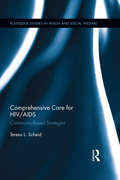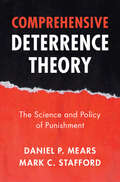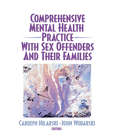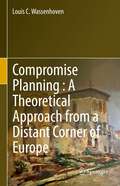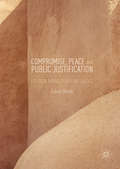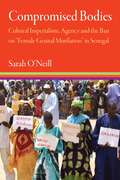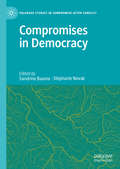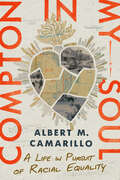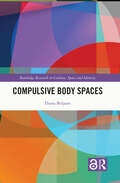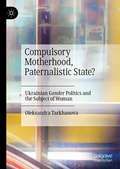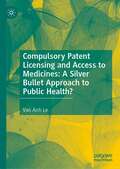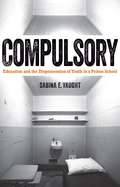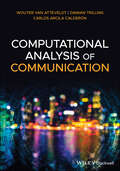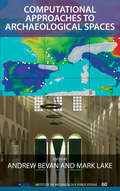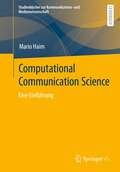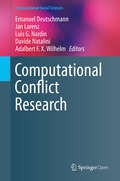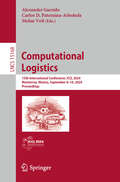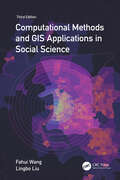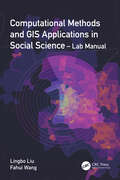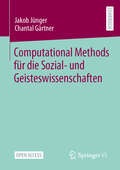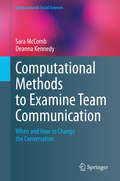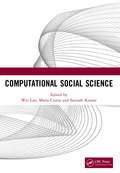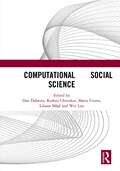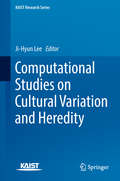- Table View
- List View
Comprehensive Care for HIV/AIDS: Community-Based Strategies (Routledge Studies in Health and Social Welfare #12)
by Teresa L. ScheidA comprehensive health care system consists of services that are coordinated and integrated along the full continuum of care. For HIV patients, this includes physical health care, infectious disease management, crisis care, mental health care, substance abuse counseling, and social support services including housing, transportation, subsistence, and supports for dealing with multiple sources of stigma. This book highlights the dilemmas faced in providing comprehensive, integrated care to individuals living with HIV, providing both an understanding of existing efforts to integrate diverse systems of care, as well as insight into ways in which systems of care must be challenged in order to meet the needs of people living with HIV. Comprehensive Care for HIV/AIDS is the result of collaborative work with the county Health Department, numerous community-based organizations, and several planning boards in a metropolitan area, which have sought to provide integrated care to people living with HIV. It will be a valuable resource to the diverse community of HIV researchers, advocates and providers.
Comprehensive Deterrence Theory: The Science and Policy of Punishment
by Daniel P. Mears Mark C. StaffordFirst articulated more than 250 years ago, deterrence remains a central theory in criminology and continues to be the bedrock of the vast bulk of criminal justice policy. But few updates to the original theory of deterrence have been made, and crime-based punishment has only grown tougher, resulting in a historically unprecedented growth in imprisonment and an even greater reliance on deterrence to justify all kinds of punishment. These changes have occurred despite consistent or strong evidence to show that such punishments actually deter crime. In this book, renowned criminologists Daniel P. Mears and Mark C. Stafford provide an in-depth understanding of the classical account of deterrence theory, its limitations, and a reconceptualized version that establishes a more complete and powerful picture of how legal punishments can deter crime. Thorough and corrective, Comprehensive Deterrence Theory gives readers a new way of thinking about and understanding legal punishment.
Comprehensive Mental Health Practice with Sex Offenders and Their Families
by M. Carolyn Hilarski John S WodarskiA comprehensive look at the many types of male and female sex offenders who victimize children, adolescents, and adultsComprehensive Mental Health Practice with Sex Offenders and Their Families presents practitioners, professionals, and policymakers with effective, user-friendly practice methods for working with all types of sex offenders. Each chapter provides an overview of a specific category of sex offender and presents case examples and sample treatment plans with short- and long-term goals and objectives. This unique book also includes the latest assessment and intervention methods, family and relapse prevention efforts, and cultural issues that affect service delivery.Comprehensive Mental Health Practice with Sex Offenders and Their Families examines the etiology, prevalence, and behavioral consequences of eight different sex offender typologies to provide you with a much broader focus than you&’ll find in other sex offender books currently on the market. The book explores gender issues, demographics, offense characteristics, family characteristics, and assessment issues in dealing with both male and female sex offenders who use psychological and physical means to victimize children, adolescents, and adults. The end result is effective as a reference for health and mental health practitioners, as a resource for program implementation and outcome evaluation for policymakers and researchers, and as a classroom aid for the next generation of social workers and health and mental health providers.Comprehensive Mental Health Practice with Sex Offenders and Their Families examines: child sex offenders-inappropriate, developmentally precocious, and aggressive sexual behavior among children adolescent sex offenders-criminal sexual acts committed by juveniles adult male sex offenders-the average male sexual molester will victimize hundreds of children in his lifetime women who sexually abuse children-challenging the stereotypes about motherhood and female-child relationships professional perpetrators-clerics, teachers, tutors, athletic coaches intellectually and developmentally challenged sex offenders-sexually abusive acts committed by people with intellectual disabilities (ID) violent sex offenders-physical and psychological injuries suffered during sexual violation comorbid psychopathology in child, adolescent, and adult sexual offenders-anti-social, narcissistic, and sadistic behaviors, learning problems, neuropsychological impairments, and moreComprehensive Mental Health Practice with Sex Offenders and Their Families is an essential resource for anyone working with diverse groups of sex offenders.
Compromise Planning : A Theoretical Approach from a Distant Corner of Europe
by Louis C. WassenhovenThe purpose of the book is to elaborate a planning theory which departs from the plethora of theories which reflect the conditions of developed countries of the North-West. The empirical material of this effort is derived from a country, Greece, which sits on the edge between North-West and South-East, at the corner of Europe. No doubt, there is extensive international literature on planning theory in general from a bewildering variety of viewpoints. The interested professional or student of urban and regional planning is certainly aware of the dizzying flood of books, articles and research reports on planning theory and of their never-ending borrowing of obscure concepts from more respectable scientific disciplines, from mathematics to philosophy and from physics to economics, human geography and sociology. He or she probably observed that there is a growing interest in theoretical approaches from the viewpoint of the so-called “Global South”. The author of the present book has for many decades faced the impasse of attempting to transplant theories founded on the experience of the North-West to countries with a totally different historical, political, social and geographical background. He learned that the reality that planners face is unpredictable, patchy, and responsive to social processes, frequently of a very pedestrian nature. Planning strives to deal with private interests which planners are keen to envelop in a single “public interest”, which is extremely hard to define. The behaviour of the average citizen, far from being that of the neoclassical model of the homo economicus, is that of an individual, a kind of homo individualis, who interacts with the state and the public administration within a complex web of mutual dependence and negotiation. The state and its administrative apparatus, i.e., the key-determinants and fixers of urban and regional planning policy, bargain with this individual, offer inducements, exemptions, derogations and privileges, deviate unhesitatingly from their grand policy pronouncements, but still defend the rationality and comprehensiveness of the planning system they have legislated and operationalized. It is by and large a successful modus vivendi, but only thanks to a constant practice of compromise. Hence, the term compromise planning, which the author coined as an alternative to all the existing theoretical forms of planning. This is the sort of planning, and of the accompanying theory, with which he deals in this book. It is the outcome of experience and knowledge accumulated in a long personal journey of academic teaching in England and Greece, research, and professional involvement.
Compromise, Peace and Public Justification: Political Morality Beyond Justice
by Fabian WendtThis book explores the morality of compromising. The author argues that peace and public justification are values that provide moral reasons to make compromises in politics, including compromises that establish unjust laws or institutions. He explains how it is possible to have moral reasons to agree to moral compromises and he debates our moral duties and obligations in making such compromises. The book also contains discussions of the sources of the value of public justification, the relation between peace and justice, the nature of modus vivendi arrangements and the connections between compromise, liberal institutions and legitimacy. In exploring the morality of compromising, the book thus provides some outlines for a map of political morality beyond justice.
Compromised Bodies: Cultural Imperialism, Agency, and the Ban on “Female Genital Mutilation” in Senegal (Contemporary Ethnography)
by Sarah O'NeillThis ethnography unravels the continuing political tensions surrounding Senegal’s 1999 national ban on “female genital mutilation”The Senegalese parliament authorized a national ban on “Female Genital Mutilation” in 1999. Because only a third of the Senegalese population practiced female genital cutting (FGC) at the time, policy makers did not expect that the new law would cause controversy or provoke commotion. Yet, in Fouta Toro and among Fulani, who traditionally practiced FGC, the response to the new law was fury, and frustrations often turned violent. More than a decade after the ban, Fouta Toro was considered “the most difficult region” for anti-FGC activists, both from inside and outside the government. Tires were burned, international NGO delegates were threatened, and activists publicly speaking out against the practice were religiously condemned. Animosity toward the ban remains palpable in the region to this day. The ban, many (but not all) locals say, is nothing other than an overt act of Western cultural imperialism imposed on their community. For these individuals, resisting the ban is critical for maintaining the autonomy and integrity of a traditional way of life. And from the outside, opposition to the law and NGOs can seem unified.However, anthropologist Sarah O’Neill discovers that on the ground, there are tensions between those who oppose the ban and those who support it—even as that support is nuanced and often complicated. This ethnography unravels the continuing political tensions surrounding both national and international interventions in Fouta Toro and in Senegal that place protection of the female body at the center of their concerns. By way of the many stories of ordinary women and men caught up in debates around the value of the practice and meaning of FGC, Compromised Bodies reveals the personal struggles and difficult decisions Fulani face, be they traditional cutters, religious leaders, mothers, husbands, divorced women, or anti-FGC activists.
Compromises in Democracy (Palgrave Studies in Compromise after Conflict)
by Stéphanie Novak Sandrine BaumeThis book provides an interdisciplinary examination of the relationship between compromise and democracy. Compromises have played a significant role in our representative democracies and yet the nature of the relationship between compromise and democracy has generally raised tricky theoretical questions and generated ambiguous evaluations. This book focuses on the relationship between compromise and liberal democracies from both a cultural and institutional perspective and addresses new and lesser-explored aspects of the relationship. It explores a variety of topics including: compromise and in-commensurable values, antagonist paradigms, compromise and majority decisions, compromise and publicity, compromise and post-conflict societies, compromise and anti-system political parties, and compromise and the understanding of political representation. Compromises in Democracy offers an original perspective on the topic by assembling contributions from the fields of philosophy, sociology, political theory, political science and history of ideas.
Compton in My Soul: A Life in Pursuit of Racial Equality (Stanford Studies in Comparative Race and Ethnicity)
by Albert M. CamarilloLessons and inspiration from a lifetime of teaching about race and ethnic relations When Al Camarillo grew up in Compton, California, racial segregation was the rule. His relatives were among the first Mexican immigrants to settle there—in the only neighborhood where Mexicans were allowed to live. The city's majority was then White, and Compton would shift to a predominantly Black community over Al's youth. Compton in My Soul weaves Al's personal story with histories of this now-infamous place, and illuminates a changing US society—the progress and backslides over half a century for racial equality and educational opportunity. Entering UCLA in the mid 1960s, Camarillo was among the first students of color, one of only forty-four Mexican Americans on a campus of thousands. He became the first Mexican American in the country to earn a PhD in Chicano/Mexican American history, and established himself as a preeminent US historian with a prestigious appointment at Stanford University. In this candid and warm-hearted memoir, Camarillo offers his career as a vehicle for tracing the evolution of ethnic studies, reflecting on intergenerational struggles to achieve racial equality from the perspective at once of a participant and an historian. Camarillo's story is a quintessential American chronicle and speaks to the best and worst of who we are as a people and as a nation. He unmasks fundamental contradictions in American life—racial injustice and interracial cooperation, inequality and equal opportunity, racial strife and racial harmony. Even as legacies of inequality still haunt American society, Camarillo writes with a message of hope for a better, more inclusive America—and the aspiration that his life's journey can inspire others as they start down their own path.
Compulsive Body Spaces (Routledge Research in Culture, Space and Identity)
by Diana N.M. BeljaarsCompulsive Body Spaces presents a spatial understanding of compulsion. Providing a compelling account of the lives of 15 people with Tourette syndrome, it demystifies the seemingly irrational, purposeless and meaningless character of this behaviour. It demonstrates how attending to the spatial circumstances under which compulsive acts, like touching, ordering, and aligning objects take place, can produce valuable novel insights that complement neuroscientific, psychiatric or psychological knowledge. By paying attention to the sensory, material, and social environment of the body during its performance of compulsive acts, the book establishes the ways in which configurations of bodies, objects, and spaces disrupt people’s lives or allow them to thrive. This collaborative, qualitative study that is based on in-depth interviews, observations, and mobile eye-tracking places the book at the forefront of a new wave of patient emancipation in medical research, and gives rise to a renewed consideration of what empathetic, context-sensitive care may look like in the 21st century. In turn, its insights give rise to a groundbreaking spatial conceptualisation of wellbeing. Considering the compulsive capacities of a broader humanity, Compulsive Body Spaces highlights the compulsive dimension in bodily spatiality, which underpins the very core theories of human life as embodied and performed. This book will be of interest to students and scholars in science and technology studies, human geography, sociology, health and social care, medical humanities, continental philosophy and disability studies.
Compulsory Motherhood, Paternalistic State?: Ukrainian Gender Politics and the Subject of Woman
by Oleksandra TarkhanovaThis book examines Ukrainian state gender politics and investigates how gendered subject positions and policy discourses are constructed within and through social policies. Set against the backdrop of the post-Soviet transformations, nation-building, neoliberalization, and post-Maidan political transformations, policy and discursive changes reflect and reproduce the gender norms that not only derive from these ideological processes but also actively legitimize and enable them. This book considers how the relations between the state and woman-citizen are changing: from socialist paternalism to nationalist affective bond and neoliberal sacrificial citizenship, which conceals women within families but also deeply relies on their unpaid work. The book brings the Ukrainian case into the European debate on conservative neoliberal transformations and anti-gender political sentiment, and by doing that, advances the feminist theorization on neoliberalism. This book will be of particular interest to scholars in gender politics, sociology of policy, and post-socialist or Eastern European studies.
Compulsory Patent Licensing and Access to Medicines: A Silver Bullet Approach to Public Health?
by Van Anh LeThis timely monograph focuses on India and Brazil’s use of compulsory licensing, one of the most significant and controversial TRIPS flexibilities. This is a topical work at this critical time when the COVID-19 has stirred up the debate about compulsory licensing and access to medicines. A closer look into the historical use of compulsory licences in certain countries can offer some takeaways for the current situation.The author studies historical developments and political conditions of the patent system and compulsory licensing from the earliest stage to the modern arena, with a great emphasis on TRIPS. After conducting a cross-national study of India and Brazil, the book moves on to evaluate the different philosophies on compulsory licensing of multilateral organizations such as the EU, the WIPO, the WTO, and NGOs.This important book will strongly appeal to intellectual property students, academics, policymakers, and lawyers practicing in the area. It will also be of interest to academics working in the areas of international law, development, and public health as well as state actors and others with relevant concerns working in multilateral organizations.
Compulsory: Education and the Dispossession of Youth in a Prison School
by Sabina E. Vaught&“This is an American story, unsettled by contradictions, constituted by unresolvable loss and open-ended hope, produced through brutal exclusivities and persistent insurgencies. This is the story of Lincoln prison.&” In her Introduction, Sabina E. Vaught passionately details why the subject of prisons and prison schooling is so important. An unprecedented institutional ethnography of race and gender power in one state&’s juvenile prison school system, Compulsory will have major implications for public education everywhere.Vaught argues that through its educational apparatus, the state disproportionately removes young Black men from their homes and subjects them to the abuses of captivity. She explores the various legal and ideological forces shaping juvenile prison and prison schooling, and examines how these forces are mechanized across multiple state apparatuses, not least school. Drawing richly on ethnographic data, she tells stories that map the repression of rightless, incarcerated youth, whose state captivity is the contemporary expression of age-old practices of child removal and counterinsurgency. Through a theoretically rigorous analysis of the daily experiences of prisoners, teachers, state officials, mothers, and more, Compulsory provides vital insight into the broad compulsory systems of schooling—both Inside prison and in the world Outside—asking readers to reconsider conventional understandings of the role, purpose, and value of state schooling today.
Computational Analysis of Communication
by Wouter van Atteveldt Damian Trilling Carlos Arcila CalderonProvides clear guidance on leveraging computational techniques to answer social science questions In disciplines such as political science, sociology, psychology, and media studies, the use of computational analysis is rapidly increasing. Statistical modeling, machine learning, and other computational techniques are revolutionizing the way electoral results are predicted, social sentiment is measured, consumer interest is evaluated, and much more. Computational Analysis of Communication teaches social science students and practitioners how computational methods can be used in a broad range of applications, providing discipline-relevant examples, clear explanations, and practical guidance. Assuming little or no background in data science or computer linguistics, this accessible textbook teaches readers how to use state-of-the art computational methods to perform data-driven analyses of social science issues. A cross-disciplinary team of authors—with expertise in both the social sciences and computer science—explains how to gather and clean data, manage textual, audio-visual, and network data, conduct statistical and quantitative analysis, and interpret, summarize, and visualize the results. Offered in a unique hybrid format that integrates print, ebook, and open-access online viewing, this innovative resource: Covers the essential skills for social sciences courses on big data, data visualization, text analysis, predictive analytics, and others Integrates theory, methods, and tools to provide unified approach to the subject Includes sample code in Python and links to actual research questions and cases from social science and communication studies Discusses ethical and normative issues relevant to privacy, data ownership, and reproducible social science Developed in partnership with the International Communication Association and by the editors of Computational Communication Research Computational Analysis of Communication is an invaluable textbook and reference for students taking computational methods courses in social sciences, and for professional social scientists looking to incorporate computational methods into their work.
Computational Approaches to Archaeological Spaces (UCL Institute of Archaeology Publications #60)
by Andrew Bevan Mark LakeThis volume of original chapters written by experts in the field offers a snapshot of how historical built spaces, past cultural landscapes, and archaeological distributions are currently being explored through computational social science. It focuses on the continuing importance of spatial and spatio-temporal pattern recognition in the archaeological record, considers more wholly model-based approaches that fix ideas and build theory, and addresses those applications where situated human experience and perception are a core interest. Reflecting the changes in computational technology over the past decade, the authors bring in examples from historic and prehistoric sites in Europe, Asia, and the Americas to demonstrate the variety of applications available to the contemporary researcher.
Computational Communication Science: Eine Einführung (Studienbücher zur Kommunikations- und Medienwissenschaft)
by Mario HaimDas Lehrbuch bietet einen Einstieg und umfassenden Überblick über die Computational Communication Science (CCS). Die CCS ist Kommunikationswissenschaft, die auf die Erforschung und Analyse großer Datenmengen, algorithmisch kuratierter Kommunikation und/oder stark computergestützter Methoden setzt. Das Lehrbuch stellt Grundlagen und zentrale Begriffe vor und dient als Orientierungshilfe in einer von informatischen Einflüssen geprägten Sozialwissenschaft. Neben diesem Grundwissen vermittelt das Lehrbuch Anwendungs- und Entwicklungskompetenz im direkten Umgang mit Werkzeugen und Quellcode sowie eine umfangreiche Kritikkompetenz zur fachkundigen Einschätzung und Bewertung entsprechender Daten und Methoden. Mit zahlreichen Beispielen aus der Kommunikationswissenschaft, die jeweils aus ethischer, rechtlicher und technologischer Perspektive betrachtet werden, liefert dieses Buch somit eine umfassende Einführung und Hilfestellung für den Gegenstand und für die Methoden der CCS, für Studierende und für Forschende, für Einführungsveranstaltungen und für Forschungsseminare.
Computational Conflict Research (Computational Social Sciences)
by Jan Lorenz Emanuel Deutschmann Luis G. Nardin Davide Natalini Adalbert F. X. WilhelmThis open access book brings together a set of original studies that use cutting-edge computational methods to investigate conflict at various geographic scales and degrees of intensity and violence. Methodologically, this book covers a variety of computational approaches from text mining and machine learning to agent-based modelling and social network analysis. Empirical cases range from migration policy framing in North America and street protests in Iran to violence against civilians in Congo and food riots world-wide. Supplementary materials in the book include a comprehensive list of the datasets on conflict and dissent, as well as resources to online repositories where the annotated code and data of individual chapters can be found and where (agent-based) models can be re-produced and altered. These materials are a valuable resource for those wishing to retrace and learn from the analyses described in this volume and adapt and apply them to their own research interests. By bringing together novel research through an international team of scholars from a range of disciplines, Computational Conflict Research pioneers and maps this emerging field. The book will appeal to students, scholars, and anyone interested in the prospects of using computational social sciences to advance our understanding of conflict dynamics.
Computational Humanities (Debates in the Digital Humanities)
by Lauren Tilton Jessica Marie Johnson David MimnoThe first book to intervene in debates on computation in the digital humanities Bringing together leading experts from across North America and Europe, Computational Humanities redirects debates around computation and humanities digital scholarship from dualistic arguments to nuanced discourse centered around theories of knowledge and power. This volume is organized around four questions: Why or why not pursue computational humanities? How do we engage in computational humanities? What can we study using these methods? Who are the stakeholders? Recent advances in technologies for image and sound processing have expanded computational approaches to cultural forms beyond text, and new forms of data, from listservs and code repositories to tweets and other social media content, have enlivened debates about what counts as digital humanities scholarship. Providing case studies of collaborations between humanities-centered and computation-centered researchers, this volume highlights both opportunities and frictions, showing that data and computation are as much about power, prestige, and precarity as they are about p-values. Contributors: Mark Algee-Hewitt, Stanford U; David Bamman, U of California, Berkeley; Kaspar Beelen, U of London; Peter Bell, Philipps U of Marburg; Tobias Blanke, U of Amsterdam; Julia Damerow, Arizona State U; Quinn Dombrowski, Stanford U; Crystal Nicole Eddins, U of Pittsburgh; Abraham Gibson, U of Texas at San Antonio; Tassie Gniady; Crystal Hall, Bowdoin College; Vanessa M. Holden, U of Kentucky; David Kloster, Indiana U; Manfred D. Laubichler, Arizona State U; Katherine McDonough, Lancaster U; Barbara McGillivray, King&’s College London; Megan Meredith-Lobay, Simon Fraser U; Federico Nanni, Alan Turing Institute; Fabian Offert, U of California, Santa Barbara; Hannah Ringler, Illinois Institute of Technology; Roopika Risam, Dartmouth College; Joshua D. Rothman, U of Alabama; Benjamin M. Schmidt; Lisa Tagliaferri, Rutgers U; Jeffrey Tharsen, U of Chicago; Marieke van Erp, Royal Netherlands Academy of Arts and Sciences; Lee Zickel, Case Western Reserve U.
Computational Logistics: 15th International Conference, ICCL 2024, Monterrey, Mexico, September 8–10, 2024, Proceedings (Lecture Notes in Computer Science #15168)
by Stefan Voß Alexander Garrido Carlos D. Paternina-ArboledaThis book constitutes the refereed proceedings of the 15th International Conference on Computational Logistics, ICCL 2024, held in Monterrey, Mexico, during September 8–10, 2024. The 23 full papers presented in this volume were carefully reviewed and selected from 52 submissions.They were organized in topical sections as follows: AI-Robotics/Logistics; AI-Driven Supply Chains; Freight and Transport Planning; Maritime Logistics; Retail, Logistics and Nearshoring; Sustainability.
Computational Methods and GIS Applications in Social Science
by Fahui Wang Lingbo LiuThis textbook integrates GIS, spatial analysis, and computational methods for solving real-world problems in various policy-relevant social science applications. Thoroughly updated, the third edition showcases the best practices of computational spatial social science and includes numerous case studies with step-by-step instructions in ArcGIS Pro and open-source platform KNIME. Readers sharpen their GIS skills by applying GIS techniques in detecting crime hotspots, measuring accessibility of primary care physicians, forecasting the impact of hospital closures on local community, or siting the best locations for business. FEATURES Fully updated using the latest version of ArcGIS Pro and open-source platform KNIME Features two brand-new chapters on agent-based modeling and big data analytics Provides newly automated tools for regionalization, functional region delineation, accessibility measures, planning for maximum equality in accessibility, and agent-based crime simulation Includes many compelling examples and real-world case studies related to social science, urban planning, and public policy Provides a website for downloading data and programs for implementing all case studies included in the book and the KNIME lab manual Intended for students taking upper-level undergraduate and graduate-level courses in quantitative geography, spatial analysis, and GIS applications, as well as researchers and professionals in fields such as geography, city and regional planning, crime analysis, public health, and public administration.
Computational Methods and GIS Applications in Social Science - Lab Manual
by Fahui Wang Lingbo LiuThis lab manual is a companion to the third edition of the textbook Computational Methods and GIS Applications in Social Science. It uses the open-source platform KNIME to illustrate a step-by-step implementation of each case study in the book. KNIME is a workflow-based platform supporting visual programming and multiple scripting language such as R, Python, and Java. The intuitive, structural workflow not only helps students better understand the methodology of each case study in the book, but also enables them to easily replicate, transplant and expand the workflow for further exploration with new data or models. This lab manual could also be used as a GIS automation reference for advanced users in spatial analysis. FEATURES The first hands-on, open-source KNIME lab manual written in tutorial style and focused on GIS applications in social science Includes 22 case studies from the United States and China that parallel the methods developed in the textbook Provides clear step-by-step explanations on how to use the open-source platform KNIME to understand basic and advanced analytical methods through real-life case studies Enables readers to easily replicate and expand their work with new data and models A valuable guide for students and practitioners worldwide engaged in efforts to develop GIS automation in spatial analysis This lab manual is intended for upper-level undergraduate and graduate students taking courses in quantitative geography, spatial analysis, GIS applications in socioeconomic studies, GIS applications in business, and location theory, as well as researchers in the similar fields of geography, city and regional planning, sociology, and public administration.
Computational Methods für die Sozial- und Geisteswissenschaften
by Jakob Jünger Chantal GärtnerMit Computational Methods lassen sich digitale Welten wissenschaftlich erforschen und gestalten. Das Open-Access-Lehrbuch vermittelt zunächst grundlegende Kompetenzen für die automatisierte Erhebung und Aufbereitung von Daten und für den Umgang mit Datenbanken. Eine Einführung in die Programmiersprachen R und Python sowie in Versionsverwaltungen und Cloud-Computing eröffnet Wege für kreative Analyseansätze beim Umgang mit großen und kleinen Datensätzen. Schließlich werden Szenarien in sozial- und geisteswissenschaftlichen Anwendungsfeldern durchgespielt. Dazu zählen die automatisierte Datenerhebung über Programmierschnittstellen und Webscraping, automatisierte Textanalysen, Netzwerkanalysen, maschinelles Lernen und Simulationsverfahren. Neben einer konzeptionellen Einführung in die jeweiligen Themenfelder geht es vor allem darum, in kurzen Tutorials selbst erste praktische Erfahrungen zu sammeln sowie weiterführende Möglichkeiten, aber auch Limitationen, von Computational Methods kennenzulernen.
Computational Methods to Examine Team Communication: When and How to Change the Conversation (Computational Social Sciences)
by Sara McComb Deanna KennedyThe primary focus of this book is an examination of longitudinal team communication and its impact on team performance. This theoretically-grounded, holistic examination of team communication includes cross-condition comparisons of team (i.e., distributed/in person, unrestricted/time pressured, two performance episodes) and employs multiple quantitative methodological approaches to examine the phenomena of interest. This book simultaneously provides practical content for researchers and practitioners in the social sciences and humanities. Included are step-by-step instructions for the methodologies employed, and distillations of findings via Managerial Minutes that highlight best practices and/or examples to help enhance team communication in practice.
Computational Social Science: Proceedings of the 1st International Conference on New Computational Social Science (ICNCSS 2020), September 25-27, 2020, Guangzhou, China
by Wei LuoSelected papers from the International Conference on New Computational Social Science, focusing on the following five aspects: Big data acquisition and analysis, Integration of qualitative research and quantitative research, Sociological Internet experiment research, Application of ABM simulation method in Sociology Research, Research and development of new social computing tools. With the rapid development of information technology, especially sweeping progress in the Internet of things, cloud computing, social networks, social media and big data, social computing, as a data-intensive science, is an emerging field that leverages the capacity to collect and analyze data with an unprecedented breadth, depth and scale. It represents a new computing paradigm and an interdisciplinary field of research and application. A broad comprehension of major topics involved in social computing is important for both scholars and practitioners. This proceedings presents and discusses key concepts and analyzes the state-of-the-art of the field. The conference not only gave insights on social computing, but also affords conduit for future research in the field. Social computing has two distinct trends: One is on the social science issues, such as computational social science, computational sociology, social network analysis, etc; The other is on the use of computational techniques. Finally some new challenges ahead are summarized, including interdisciplinary cooperation and training, big data sharing for scientific data mashups, and privacy protect.
Computational Social Science: Proceedings of the 2nd International Conference on New Computational Social Science (ICNCSS 2021), October 15-17, 2021, Suzhou, Jiangsu, China
by Wei Luo Dan Dobrota Roshan Chitrakar Ciurea Maria Liliana MâţâThe proceedings publish selected papers from the 2nd International Conference on New Computational Social Science, focusing on the following five aspects: Big data acquisition and analysis, Integration of qualitative research and quantitative research, Sociological Internet experiment research, Application of ABM simulation method in Sociology Research, Research and development of new social computing tools. With the rapid development of information technology, especially sweeping progress in the Internet of things, cloud computing, social networks, social media and big data, social computing, as a data-intensive science, is an emerging field that leverages the capacity to collect and analyze data with an unprecedented breadth, depth and scale. It represents a new computing paradigm and an interdisciplinary field of research and application. A broad comprehension of major topics involved in social computing is important for both scholars and practitioners. This proceedings presents and discusses key concepts and analyzes the state-of-the-art of the field. The conference not only gave insights on social computing, but also affords conduit for future research in the field. Social computing has two distinct trends: One is on the social science issues, such as computational social science, computational sociology, social network analysis, etc; the other is on the use of computational techniques. Finally, some new challenges ahead are summarized, including interdisciplinary cooperation and training, big data sharing for scientific data mashups, and privacy protect.
Computational Studies on Cultural Variation and Heredity (Kaist Research Ser.)
by Ji-Hyun LeeThis book explores the emerging concept of cultural DNA, considering its application across different fields and examining commonalities in approach. It approaches the subject from four different perspectives, in which the topics include theories, analysis and synthesis of cultural DNA artefacts. After an opening section which reviews theoretical work on cultural DNA research, the second section discusses analysis & synthesis of cultural DNA at the urban scale. Section three covers analysis & synthesis of cultural DNA artefacts, and the final section offers approaches to grammar-based cultural DNA research.The book places emphasis on two specific axes: one is the scale of the object under discussion, which ranges from the small (handheld artefacts) to the very large (cities); and the other is the methodology used from analysis to synthesis. This diverse approach with detailed information about grammar-based methodologies toward cultural DNA makes the book unique.This book will serve as a source of inspiration for designers and researchers trying to find the essence, archetype, and the building blocks of our environment for the incorporation of social and cultural factors into their designs.
